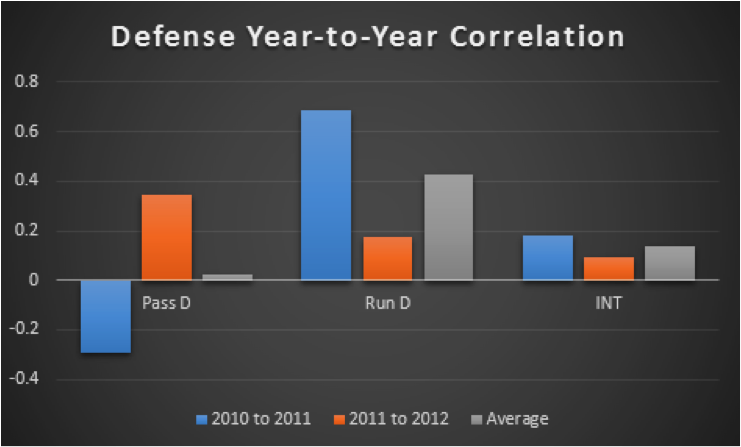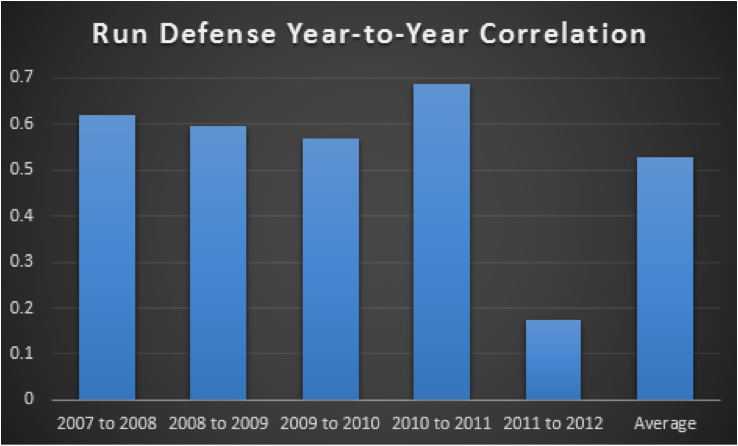This article is part of our According to the Data series.
Don't even bother to look at strength of schedule stats for quarterbacks. Quick, actionable advice right off the bat. In last week's article on strength of schedule, I found there's absolutely no meaningful correlation between a defense's pass defense, in terms of yards allowed (or interceptions), from one year to the next. Here's the data:

In order for strength of schedule information to be meaningful, we need to be able to predict defensive performance. After all, does it really matter if a quarterback has a "difficult" schedule if we have no idea which defenses will be good and bad in the future? Spoiler alert: no, it doesn't.
However, I found that a team's rank in run defense is pretty consistent from year to year (a strength of correlation of 0.529). Take a look:

There's been a positive correlation in each of the past five seasons, and it's been quite strong at times. But why in the world do the best run defenses stay the best while the best pass defenses don't? I explained my thoughts last week:
I think the answer is that run defense more accurately reflects actual team strength. The best teams are typically winning late in games, so their final run defense rank is usually pretty high since they don't see as many attempts. It's just the opposite for the worst teams, who see a lot of rushes attempts late in games.
You might say that we should see the
Don't even bother to look at strength of schedule stats for quarterbacks. Quick, actionable advice right off the bat. In last week's article on strength of schedule, I found there's absolutely no meaningful correlation between a defense's pass defense, in terms of yards allowed (or interceptions), from one year to the next. Here's the data:

In order for strength of schedule information to be meaningful, we need to be able to predict defensive performance. After all, does it really matter if a quarterback has a "difficult" schedule if we have no idea which defenses will be good and bad in the future? Spoiler alert: no, it doesn't.
However, I found that a team's rank in run defense is pretty consistent from year to year (a strength of correlation of 0.529). Take a look:

There's been a positive correlation in each of the past five seasons, and it's been quite strong at times. But why in the world do the best run defenses stay the best while the best pass defenses don't? I explained my thoughts last week:
I think the answer is that run defense more accurately reflects actual team strength. The best teams are typically winning late in games, so their final run defense rank is usually pretty high since they don't see as many attempts. It's just the opposite for the worst teams, who see a lot of rushes attempts late in games.
You might say that we should see the same sort of effect with pass defense; if the best teams are winning and get thrown on a lot, they should give up more yards. That's true to an extent, but it's also important to remember that pass defense is more vital to team success than run defense. Many times, teams acquire leads by throwing the ball effectively and stopping the pass, then milk it away with the run. So the winning teams that get passed on a lot late in games probably didn't give up many passing yards earlier, meaning they wouldn't rank as low overall, despite the extra attempts.
In any event, it seems like if we're going to focus on strength of schedule, it should be for running backs. That's where the money's at. So let's dig deeper.
Does strength of schedule hold up over 16 games?
When calculating the strength of schedule figures, I was looking at individual defenses from year to year. To know if it's meaningful for our fantasy projections, though, we need to figure out how much the numbers "cancel out" over a full season. That is, how does one running back's schedule compare to another's schedule over the course of a season?
To determine that, I decided to examine the schedules for two teams in the league - the Jets, who face the easiest run defenses, and the Ravens, who face the most challenging run defenses.
| Jets Schedule | Jets' Opp Rush Yds Allowed | Ravens Schedule | Ravens' Opp Rush Yds Allowed |
| Bucs | 82.5 | Broncos | 91.1 |
| Pats | 101.9 | Browns | 118.6 |
| Bills | 145.8 | Texans | 97.5 |
| Titans | 127.2 | Bills | 145.8 |
| Falcons | 123.2 | Dolphins | 108.4 |
| Steelers | 90.6 | Packers | 118.5 |
| Pats | 101.9 | Steelers | 90.6 |
| Bengals | 107.2 | Browns | 118.6 |
| Saints | 147.6 | Bengals | 107.2 |
| Bills | 145.8 | Bears | 101.7 |
| Ravens | 122.8 | Jets | 133.6 |
| Dolphins | 108.4 | Steelers | 90.6 |
| Raiders | 118.6 | Vikings | 105.8 |
| Panthers | 110.1 | Lions | 118.1 |
| Browns | 118.6 | Pats | 101.9 |
| Dolphins | 108.4 | Bengals | 107.2 |
| Average: 116.3 | Average: 109.7 |
Seven yards!? We're breaking down all of these numbers over seven yards!? And when you factor in the modest correlation in year-to-year run defense, i.e. our uncertainty in projecting defenses, that difference shrinks closer to just 3.5 yards. And that's the difference between the team with the easiest run defense schedule and the team with the most difficult one!
So after all that, our conclusion is that, regardless of how "difficult" or "easy" two running backs' schedules appear, we're never justified in projecting them more than 3.5 yards per game apart based on the schedule alone. Sorry, but I'm not changing my rankings over 3.5 yards per game. There's just nothing there.
Using Defensive Strength In-Season
The reason assessing strength of schedule is a fruitless endeavor is that the highs and lows of teams' schedules tend to even out over the course of 16 games. And the difference that remains get smoothed out more by the uncertainty of projecting defenses from year to year.
But what about on a weekly basis? While I wouldn't necessarily label analyzing a matchup the same as assessing strength of schedule, I still think the results from this study can affect our in-season lineup decisions. Namely, I think we're justified in caring more about a running back's opponent than the opponent for other positions.
If you recall, I found that run defense is more consistent than pass defense because the former matches up with team strength; good teams are usually winning (and not getting run on) later in games. But most teams acquire a lead by passing well, so there's not much of a relationship between first half run defense and second half run defense.
On the other hand, because defenses that stop the pass early are often winning, they get thrown on more often late in games, increasing the total yards they allow. Poor pass defense early often results in getting behind, meaning there won't be as many attempts later. There's an inverse relationship that creates less of a deviation in pass defense stats than what we see with run defense, i.e. the opponent doesn't matter as much. If you throw the ball poorly early, chances are you'll have more attempts later to make up for it.
So here's the most actionable advice I can give you heading into the 2013 season:
• 1. Don't worry about preseason strength of schedule, at all, for any position.
• 2. Don't worry (too much) about team matchups for quarterbacks, wide receivers and tight ends. The individual matchups matter for wide receivers and tight ends. In general, just play your best guys.
• 3. If you can't decide between two running backs, play the one on the team with the best chance to win its game.
That's it. I'm exhausted.
Jonathan Bales is the author of the Fantasy Football for Smart People book series. He also runs the "Running the Numbers" blog at DallasCowboys.com and writes for the New York Times.










